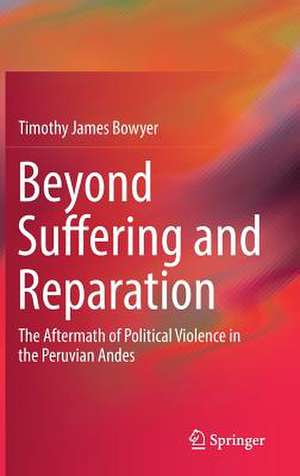Beyond Suffering and Reparation: The Aftermath of Political Violence in the Peruvian Andes
Autor Timothy James Bowyeren Limba Engleză Hardback – 14 noi 2018
Preț: 379.89 lei
Preț vechi: 399.88 lei
-5% Nou
Puncte Express: 570
Preț estimativ în valută:
72.70€ • 75.62$ • 60.02£
72.70€ • 75.62$ • 60.02£
Carte tipărită la comandă
Livrare economică 14-28 aprilie
Preluare comenzi: 021 569.72.76
Specificații
ISBN-13: 9783319989822
ISBN-10: 3319989820
Pagini: 193
Ilustrații: XXXI, 338 p. 3 illus.
Dimensiuni: 155 x 235 mm
Greutate: 0.69 kg
Ediția:1st ed. 2019
Editura: Springer International Publishing
Colecția Springer
Locul publicării:Cham, Switzerland
ISBN-10: 3319989820
Pagini: 193
Ilustrații: XXXI, 338 p. 3 illus.
Dimensiuni: 155 x 235 mm
Greutate: 0.69 kg
Ediția:1st ed. 2019
Editura: Springer International Publishing
Colecția Springer
Locul publicării:Cham, Switzerland
Cuprins
Introduction.- Chapter 1. The Complexities of Human Suffering.- Chapter 2. Setting the Scene.- Chapter 3. Participatory Research in the Aftermath of Political Violence.- Chapter 4. Losing Trust in the World.- Chapter 5. Psychic Wounds of Political Violence.- Chapter 6. Overcoming Past Trauma.- Chapter 7. Disillusionment after Change.- Chapter 8. Disillusionment and Change in a World Struggling with Post-Conflict Scenarios.- Chapter 9. Lessons from the Peruvian Highlands: ways forward and wider implications.
Notă biografică
Dr. Timothy James Bowyer is an independent researcher with more than 30 years expertise working in conflict affected rural areas of Mexico, Central and South America. He was Regional Manager, Latin America for an aid agency responsible for the management and development of long term primary health care programmes for rural communities in developing countries affected by conflict, discrimination and remoteness. He holds an MSc in Development Administration and Planning (University of Bristol) and a PhD focusing on health policy in the Peruvian Andes (Institute of Latin American Studies, University of London). He was formerly Lecturer in International Health at Swansea University, UK (2001-2011), since when he has lectured on the trauma of war and other conflict related issues.
Textul de pe ultima copertă
This book presents the key issues, debates, concepts, approaches, and questions that together define the lives of rural people living in extreme poverty in the aftermath of political violence in a developing country context. Divided into nine chapters, the book addresses issues such as the complexities of human suffering, losing trust, psychic wounds, dealing with post-traumatic stress situations, and disillusionment after change. By building knowledge about human and social suffering in a post-conflict environment, the book counters the objectification of human and social suffering and the moral detachment with which it is associated. In addition, it presents practical ways to help make things better. It discusses new methodological concepts based around empathy and participation to show how the subjective reality of human and social suffering matter. Finally, the book maps a burgeoning field of enquiry based around the need for linking psychosocial approaches with the actual lived experience of individuals and groups.
Caracteristici
Presents key issues of the lives of rural people living in extreme poverty in the aftermath of political violence in a developing country context Provides a global analysis of suffering, including the nature of suffering and its meaning for humanity Addresses the “long-term impact and psychosocial consequences of political violence” and the “deadening effects of historical amnesia”
